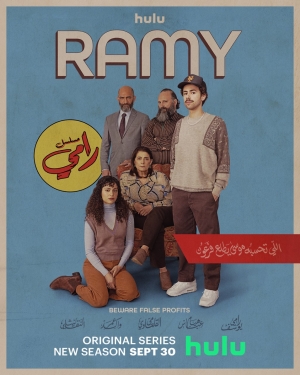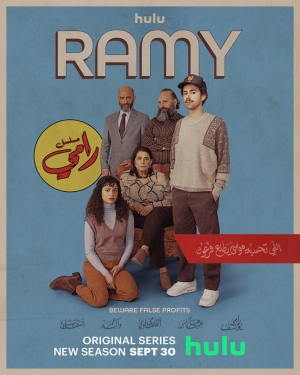Recent PhD student Lamiae Aidi offers this blog post (the third in a series) on Islamophobia and Islamic representation in popular culture as a knowledge mobilization component of her successful degree, recently completed under the supervision of Vivek Venkatesh. To read previous blogs in the series: Part 1, Part 2.
An example of a digital form of popular culture relaying new understandings of Arabs and Muslims in New Jersey and Cairo, respectively, is Hulu series Ramy. The creator of the series is 2nd generation Egyptian-American Ramy Youssef whose goal is to contest stereotypes of Muslims and to normalize representation of their diversity and differing backgrounds through his comedy work. Although the story-line centers around the spiritual journey of a young man, Ramy is popular with both Muslim and non-Muslim anglophone viewers. This is because of the creator’s use of a writing technique that centers around ‘everydayness’. In his 1927 masterpiece, Being and Time, German philosopher Martin Heidegger highlights the importance of thinking about the meaning of Being, pointing out that because the act of Being is so simple, it tends to be overlooked (Heidegger 2019). Everydayness is similarly both a fundamental feature of life and little recognized. As Henri Lefebvre confirms in his 1987 The Everyday and Everydayness, “The everyday is the most universal and the most unique condition, the most social and the most individuated, the most obvious and the best hidden” (Lefebvre 1987).
Ramy counters stereotypes of Muslims by highlighting everyday elements of that specific diasporic community and the identities that is has produced. Representation of lived experiences of female characters, such as Ramy’s sister Dena and her mother, then becomes an intent to counter stereotypes of Muslim women that does not necessarily translate into a story-line centering around terrorism or Islam but into one highlighting everydayness that is relateable to non-Muslim audiences as well. For instance, in the opening episode, while having dinner with his family, Ramy asks his parents to set him up with a Muslim woman. His parents are happy to see their son grow up, but his sister Dena responds with a “Are you f-in' kidding me? You had one lonely day at a wedding, and now you want mom to set you up?” Dina is worried that if her older brother marries, her parents will expect the same from her. “If you get married, they're gonna start putting pressure on me to start a family and stare at my stomach like it's the answer to their mid-life crisis. I don't need that shit right now. F- you, Ramy.” The predominant stereotype of the voiceless, veiled Muslim woman is contested by the voice of Dina, who is outspoken and straightforward, adamant and articulate. By looking to digress from mainstream representation of Muslim women as ‘veiled and oppressed’, Ramy’s employment of everydayness to contest stereotypes is ‘extreme’. “Extreme suggests some form of transgression and boundary-breaking” (Venkatesh 2022, 1). Everydayness in popular culture as a socio-pedagogical technique is thus disruptive in its intent to counter Islamophobia by increasing the rate of media and reality literacy. An Internet series accessible to all offering descriptions of contextual ‘realities’, Hulu series Ramy is a tool necessary for the realization of individual and collective efforts at a social pedagogy challenging preconceived notions of the ‘Other’.
References:
Abu-Lughod, Lila. Do Muslim Women Need Saving? Harvard University Press, 2013.
Alsultany, Evelyn, and Ella Shohat. Between the Middle East and the Americas: The Cultural Politics of Diaspora. Ann Arbor: University of Michigan Press, 2013.
Bayat, Asef. Life as Politics: How Ordinary People Change the Middle East. Stanford, CA: Stanford University Press, 2013.
Bullock, Katherine. “Policy Backgrounder: Defining Islamophobia for a Canadian Context.” 2017. Accessed January 25, 2023
Castillo, David R., and William Egginton. Medialogies: Reading Reality in the Age of Inflationary Media. New York: Bloomsbury Academic, an imprint of Bloomsbury Publishing, 2017.
Dabashi, Hamid. Being a Muslim in the World. New York: Palgrave Macmillan US, 2013.
Said, Edward W. Covering Islam. Vintage, 1981.
Shaheen, Jack G. Reel Bad Arabs: How Hollywood Vilifies a People. New York: Interlink Books, 2009.
Shaheen, Jack G. Guilty: Hollywood's Verdict on Arabs after 9/11. Northampton, MA: Interlink, 2008.
Shaheen, Jack G. The TV Arab. Bowling Green, OH: Bowling Green State University Popular Press, 1984.


